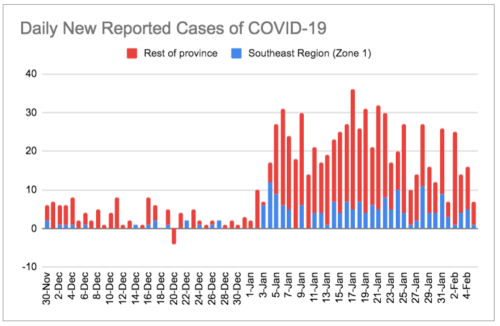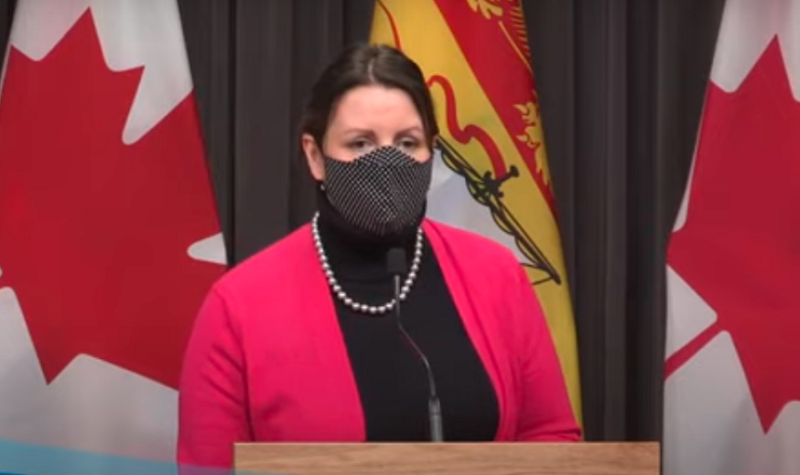At Thursday’s COVID-19 briefing, Chief Medical Officer of Health Jennifer Russell announced 16 new cases of COVID-19 in the province. Five of those cases were in Zone 1, the southeast region.
With 24 recoveries province-wide, the total active cases has now dropped to 256 cases. In Zone 1, the active case count dropped by just one, to 58 active cases on Thursday.
Yesterday marked 16 days for Zone 1 in the red phase of restrictions, and though the active case count in Zone 1 is now as low as it was on January 15, several days before the red phase was triggered, Russell said that it was still too early to relax restrictions.
“While we are seeing progress in the numbers, and they appear to be trending in the right direction, restrictions now in place will continue until at least early next week,” said Russell.
Russell said public health is “continually reevaluating” conditions, and “firmly fixed” on the goal of bringing Zones 1 and five back into the orange phase.
“We will be watching for signs that the outbreaks in these areas can be contained with fewer restrictions on public movement,” said Russell. “And I hope to be in front of you on Monday with that good news.”

Data from NB COVID-19 Dashboard. Chart: Erica Butler
FLU-LIKE SYMPTOMS ARE MORE LIKELY TO BE COVID-19, SAYS RUSSELL
Testing slowed down yesterday, with only 1,124 tests conducted, 248 of those in Zone 1.
Russell put several plugs in for testing, asking people not ignore mild symptoms, and go get assessed.
“We learned a hard lesson over the holidays about how quickly the virus can be spread through gatherings,” she said. “Especially if people ignore very mild symptoms and go don’t get tested.”
Russell also pointed out that any flu-like symptoms, usually very common at this time of year, are more than likely not the flu, because of the near disappearance of that virus this year.
“There has only been one case of influenza detected in New Brunswick so far this year,” said Russell. “Normally we see between 300 and 600 hospitalizations for flu season, and this year we have zero hospitalizations from the flu.”
“So if you have symptoms that you would normally associate with a cold or flu, please get tested,” said Russell. “It is more likely that you have COVID-19.”
UPDATE ON UK VARIANT TESTING
Not all positive COVID-19 samples will be screened for the UK Variant, which was identified recently in three of New Brunswick’s cases.
Testing for COVID-19 variants happens at the National Microbiology Lab in Winnipeg, and Russell said the province sends samples from cases they consider to be higher risk for variants.
“We do have criteria to identify people that we think are higher risk,” said Russell. “And that’s going to continue to evolve.”
The variants will become “increasingly problematic,” she said.
“Over the course of three months, we will see the variants, the UK variant anyway, replace the current version of COVID-19,” said Russell.
In addition to testing high risk samples, the province also does something called sentinel testing, where they pick random samples from each of the seven health zones each week. That’s how the variant case was found in the Mirimachi health zone, said Russell. It was a randomly selected case that was sent in.
New Brunswick is currently waiting on the results of 36 samples, said Russell. A total of 178 samples have been sent to Winnipeg since December 23. 139 came back negative, and three came back positive.
RETURN TO YELLOW NOT AN OPTION AT THIS TIME, SAYS SHEPHARD
Health Minister Dorothy Shephard also spoke Thursday, offering sympathy, but no relief to rotational workers who are now required to self-isolate away from their families, creating near perpetual isolation for some.
“I understand that we are asking a lot when we say that travellers, including rotational workers, must self isolate for 14 days away from their loved ones,” said Shephard. “I’m not going to pretend this is easy. It’s painful, and it may not seem fair. But COVID-19 does not have a sense of fairness.”
“I want to be clear, the problem is not rotational workers themselves. The problem is that all travellers are susceptible to the virus,” she said.
Shephard also addressed those wondering when the province might return to the fondly remembered yellow phase of restrictions, which is currently under revision to address new challenges posed by coronavirus variants. The minister did not provide much hope.
“While I know we would all like to see the province go back to yellow,” she said, “that is not an option at this time. We need to get some restrictions in place while we get outbreaks under control. And we need time to ensure COVID-19 variants are not spreading.”
“For now, our goal is to move the entire province to the orange alert level as soon as we can,” said Shephard.
Hear this story as reported on Tantramar Report:


